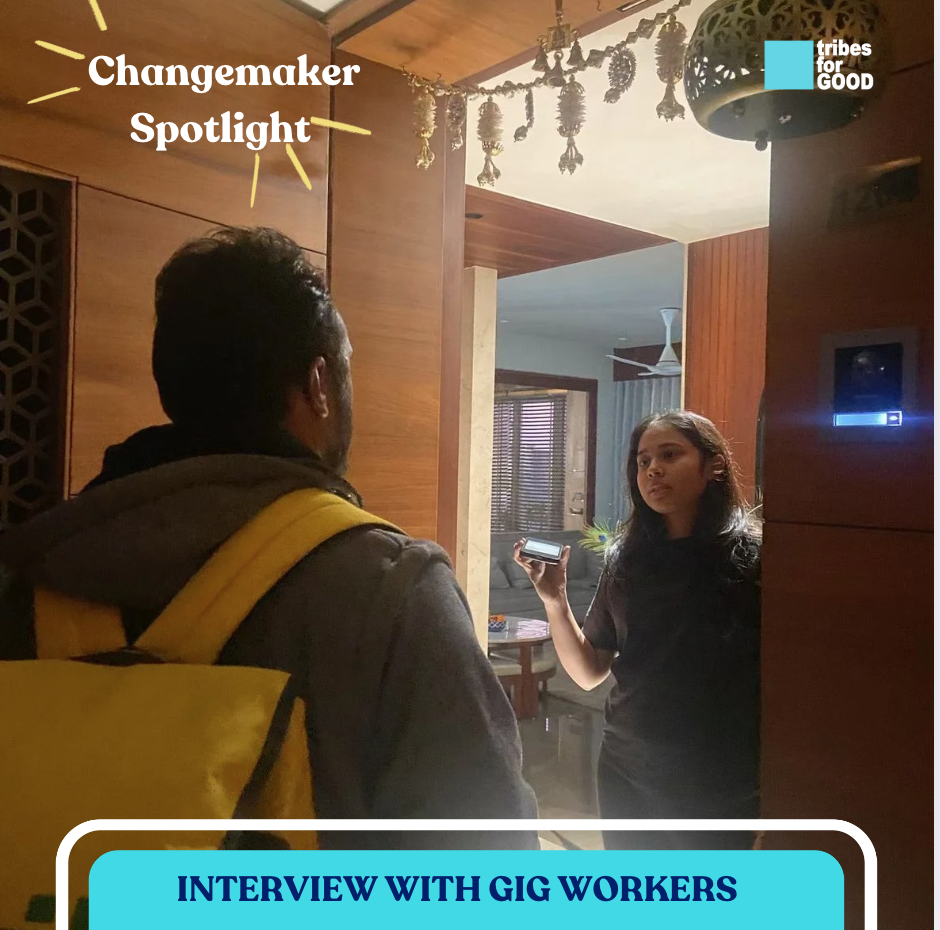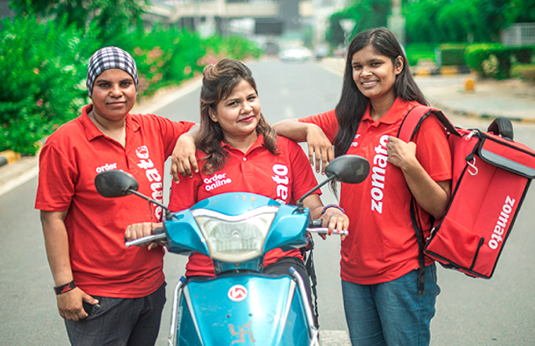The Hidden Lives of Delivery Partners: Challenges, Aspirations, and the Path to Empowerment
A dive into the change-chasing efforts of our Changemakers: Brahmi Pedhadia and Saloni Gupta.
In a world where instant gratification rules, delivery apps have changed the way we live. With just a few taps, food, groceries, and packages are delivered right to our doorsteps quickly. But how often do we think about the people behind this service? Do we ever stop to consider their struggles, dreams, or hard work?
At TribesforGOOD, School of Changemakers, we are taking meaningful steps to bring these stories to light and empower gig workers. Two of our inspiring Changemakers, Brahmi Pedhadia and Saloni Gupta, have delved into the lives of delivery partners to uncover their challenges and find ways to support them.
Let’s dive into their efforts and explore how we can make the gig economy more sustainable and equitable.
Behind the Deliveries: The Daily Grind
Through her community project, Brahmi Pedhadia engaged in heartfelt conversations with delivery partners from platforms like Zomato, Blinkit, and Blue Dart. These interactions shed light on the unique struggles and resilience of gig workers:
Zomato Partner
- Faces monotony in daily routines.
- Balances multiple jobs, including electrical work, to make ends meet.
Blinkit Partner
- As a newcomer, grapples with inconsistent orders.
- Earns approximately ₹500 per day.
Blue Dart Partner
- Experiences severe physical exhaustion, delivering 40–50 packages daily.
- Earns only ₹14 per package, highlighting the disparity in compensation.

Joining the Gig Economy: A Network of Support
Most delivery partners enter this field through referrals from friends or acquaintances, forming informal networks of mutual support. These connections often help them navigate the challenges of gig work, but there’s more that can be done to address systemic issues.

Customer Interactions: A Mixed Bag
Interactions with customers range from kind gestures—such as offering water or tea—to purely transactional exchanges. While the Zomato and Blinkit partners often experience both ends of this spectrum, the Blue Dart delivery partner reported minimal customer interactions, which they seemed quite indifferent about.
Work-Life Balance: A Balancing Act
Not all delivery partners are full-time workers:
- Zomato partner: juggles multiple jobs to sustain their livelihood.
- Blinkit and Blue Dart partners work full-time, with the latter emphasizing the physical toll of managing high delivery volumes at most times.
Earnings: A Contentious Issue
Earnings across platforms reveal stark contrasts:
- Zomato and Blinkit partners express relative satisfaction, as their income suffices for daily expenses.
- Blue Dart partner, however, feels underpaid and unsupported, especially when dealing with undelivered packages.
Challenges and Requests: What Gig Workers Need
From Brahmi’s interviews, key desires emerged:
- Fair compensation, especially for companies like Blue Dart.
- Comprehensive company support to address challenges like undelivered packages.
- Greater acknowledgment and appreciation for their critical role in driving the gig economy.
Brahmi observed that even small gestures of kindness—such as a simple “thank you”—can make a significant difference in their lives.
Creating a Path to Empowerment: Insights from Saloni Gupta’s Guide
To address the systemic issues faced by gig workers, Saloni Gupta has developed a comprehensive guide aimed at empowering them for a sustainable future.
Understanding the Gig Economy
- Definition: Flexible, independent work arrangements facilitated by digital platforms like Uber and Upwork.
- Growth: Fueled by technological advancements and changing work attitudes.
- Appeal: Offers flexibility, autonomy, and diverse income opportunities.
- Challenges: Job insecurity, lack of benefits, and limited legal protections.
Empowerment Objectives for Gig Workers
Saloni’s guide focuses on equipping gig workers with essential skills:
- Contract Management: Understanding terms like indemnity, non-compete clauses, and deliverables.
- Fair Pay Negotiation: Preparing with market research, showcasing skills, and asserting their worth.
- Financial Planning: Tracking income, saving for retirement, and investing in health insurance.
- Accessing Legal Aid: Seeking help for disputes or harassment through affordable resources.
- Continuous Learning: Upskilling through platforms like Coursera and LinkedIn Learning.
Advocacy and Self-Advancement
- Join gig worker unions or advocacy campaigns.
- Use social media to promote skills and build a personal brand.
- Participate in workshops and gain certifications for better opportunities.
Building a Sustainable Future for Gig Workers
The gig economy has become an integral part of our daily lives, offering convenience and efficiency. However, it’s crucial to recognize and address the challenges faced by the workers who power this system.
By following the insights shared by Brahmi Pedhadia and Saloni Gupta, we can:
- Advocate for fairer compensation.
- Support gig workers with tools and resources for empowerment.
- Foster a culture of acknowledgment and kindness.
Every small step counts—from offering a glass of water to driving systemic change—in making the gig economy more inclusive and sustainable for the millions who rely on it.
Let’s work together to build a future where gig workers are not just seen but valued. Are you ready to be a Changemaker?
Visit our website at www.tribesforgood.com to know more!


